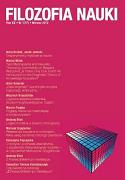„Dwa dogmaty” Quine’a jako krytyka logicznego empiryzmu
Quine’s “Two Dogmas” as a Criticism of Logical Empiricism
Author(s): Artur KoterskiSubject(s): Philosophy
Published by: Uniwersytet Warszawski - Wydział Filozofii i Socjologii, Instytut Filozofii
Keywords: analyticity; verificationism; reductivism; logical positivism
Summary/Abstract: ‘Two Dogmas of Empiricism’ has invoked the since lasting discussion about possibility of analytic/synthetic distinction. The results obtained by Quine are still presented as an argument for the internal decay of logical positivism. However, Quine’s article was anachronistic already at the time of its publication. It was years before ‘Two Dogmas’ appeared that leading representatives of logical empiricism rejected both dogmas, and advanced holistic version of empiricism. Already in 1930 Tarski started convincing Carnap that the analytic/synthetic distinction must be relativised. Further argumentation was presented by Tarski in Paris (1935). Carnap, who found his remarks ‘very deep’, never abandoned the distinction but he was aware at least since then that it could not be absolute. Carnap’s case was not exceptional. It may be argued as well that relativised analyticity is the only option for Neurath’s encyclopedism if he in fact needed this notion. With relativised analyticity logical positivists did not need to ground synonymity in a verificational theory of meaning. Therefore, they were not forced to accept reductionism either. Carnap, whom Quine accused of ‘radical reductionism’, abandoned the Aufbau theory altogether with its alleged reductionism at the very beginning of the thirties. Within Neurath’s physicalism both reductionism and verificationism were classified derogatorily as metaphysical theories. In the mid-thirties Neurath’s physicalism started turning into a sophisticated conception, ‘encyclopedism.’ It was a holistic and naturalized theory of science, strongly opposed to older types of positivism. Although in some respects different from Quine’s own proposal, it is its equivalent. Neurath’s turn to encyclopedism was catalyzed by a Poznański-Wundheiler paper, ‘The Notion of Truth in Physics’ (1934). Its main task was to examine the possibility of retaining the notion of truth in science. There they sketched a theory depicting science in terms of radical fallibility, anti-foundationalism, and holism. Their standpoint is a counterpart of Neurath’s later encyclopedism. Because science had encyclopaedic structure there, they could opt solely for relative analyticity; being physicalist they obviously could not accept reductionism. Thus, they realized Quine’s postulate and advanced empiricism or theory of science without the dogmas. The aim of this paper is twofold. Firstly, I am going to sketch Quine’s argument against the background of the views held by Carnap and Neurath at the peak of the Vienna Circle activities; they will be supported by philosophers from the Lviv-Warsaw School (Tarski, Poznański and Wundheiler). It will be claimed that Quine’s criticism was late more than fifteen years. Secondly, I am going to examine Quine’s postulate of empiricism without the dogmas and compare it briefly with theories advanced by Neurath, Poznański and Wundheiler. It will be claimed that it came to its realization and that Quine was late again.
Journal: Filozofia Nauki
- Issue Year: 20/2012
- Issue No: 1 (77)
- Page Range: 45-58
- Page Count: 14
- Language: Polish

